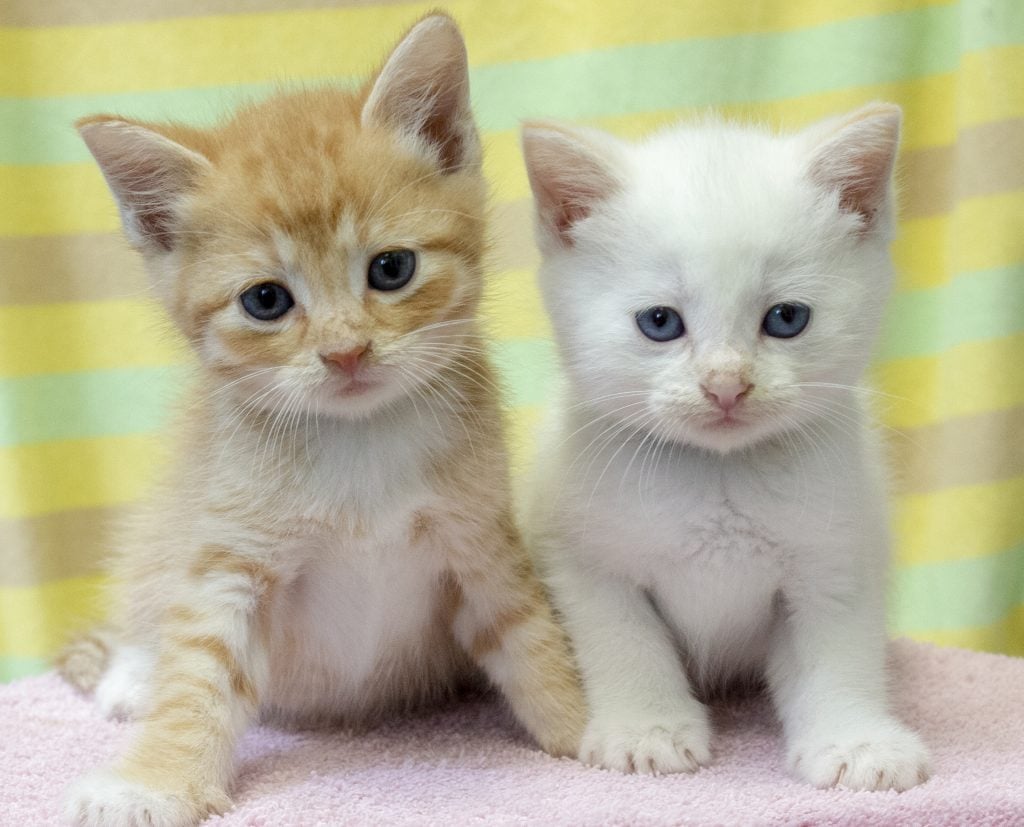Kitten Season

There are seasons for all things in life, and the birth of kittens is no exception. Like most wildlife, cats begin reproducing quickly as the weather warms up. While some places around the U.S. may experience kitten births year round, the local Lexington area can go entire cold seasons without seeing kittens at your LHS. Regardless of regional climate, the time when the greatest number of kittens are born during the year is from the beginnings of spring through late fall. This is “Kitten Season”!
During Kitten Season, The Lexington Humane Society needs community members to volunteer their hearts and homes to orphaned kittens in need of TLC or momma cats (called queens) who need a place to rest with their babies.
Different Types of Foster Needs During Kitten Season:
Bottle Babies
Experience Needed: Expert
Young orphaned kittens, think newborn to four-weeks-old, have to be bottle fed. The younger the kitten, the more frequent their feedings need to be. These littles require a lot of round-the-clock care. Kittens this young need help to stay warm and consistently gain weight. Bottle Baby care can be very difficult because any baby animal’s best chance of a happy and healthy start to life is to be raised by mom, but your investment in their lives is the next best thing they get at a second chance.
Transitional Kittens
Experience Needed: Beginner – Moderate
These kittens, around four-weeks-old, are separated from momma and still need some help growing into big, strong cats. They are transitioning to solid foods, but may still need supplemental bottle feedings or a formula and wet food mixture to make sure all of their nutritional needs are being met.
Weaned Kittens
Experience Needed: Beginner
Kittens eating solid foods are usually between five and eight-weeks-old. This age is a ton of fun for foster families! Kittens are learning how to be cats for the first time, with tons of energy and tricks to show off. Usually, these kittens are more independent and just need the time to keep growing. They’ll remain in foster care until they reach two lbs/eight-weeks-old. At that point, kittens can return to LHS to be spayed or neutered and adopted to the purrrfect forever home!
Unsocialized Kittens
Experience Needed: Moderate
Being a tiny kitten in a big ole’ world can be intimidating, especially if a kitten hasn’t had much interaction with people before. These kittens may be different ages and have different nutritional needs, but the one thing they have in common is that they don’t know what it means to be friends with humans. Unfriendly or nervous kittens might be a shock to some people or intimidating. After all, when an adult cat hisses at us, we know to give it more space. But if nervous kittens are socialized in foster homes, they can go on to a life of human companionship and care. This reduces the homeless cat population and allows cats to be better cared for (altered, vaccinated, etc). So hisses get kisses, and in no time, you’ll have happy foster kittens running around your home.
Queens with Litters
Experience Needed: Moderate
The greatest chance of survival for any baby animal is to be cared for by mom, and kittens are no exception. Pregnant or mother cats are called “queens”, and rightfully so! They do all the work for a foster family – feeding babies, keeping kittens healthy, teaching kittens how to cat, and more. All you have to do is give momma and her babies a place to rest outside of the shelter environment. This will help keep everyone stress-free and healthy as possible. Queens will need to be fostered until their babies are big and old enough for adoption, so you could potentially be fostering for a period of eight weeks or longer.
Adult Cats
Experience Needed: Beginner
Though the season is named after babies, adult cats need foster homes, too. Sometimes, adult cats have a medical need, like a cold, and need time to overcome it in a healthier environment. Sometimes, adult cats don’t have a medical need, but could use a break from shelter life while they wait for their forever homes. Let’s face it, sometimes kittens steal all the spotlight. Babies, right? Adult cats will be completely self-sufficient and just need you to love them.
Are you interested in becoming a foster parent for your Lexington Humane Society? Click here to learn more! Special thanks to our foster care program sponsor, Merck Animal Health.